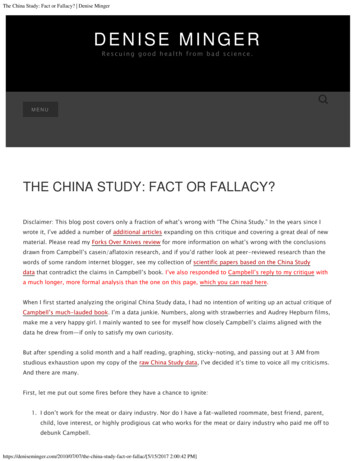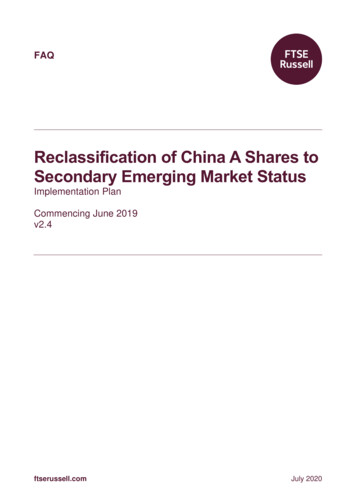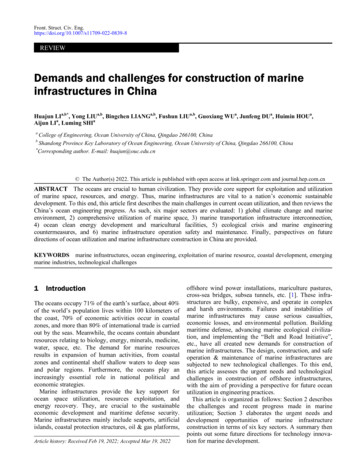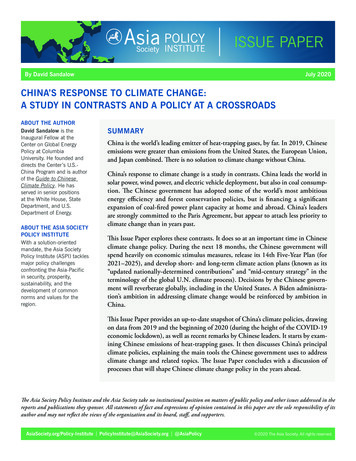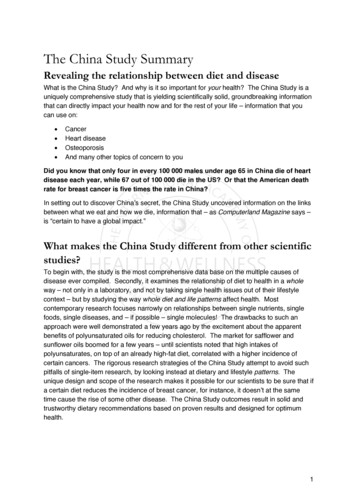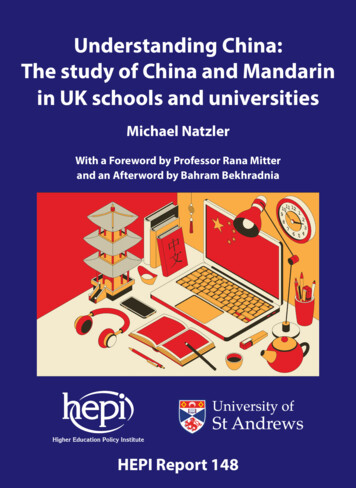
Transcription
Understanding China:The study of China and Mandarinin UK schools and universitiesMichael NatzlerWith a Foreword by Professor Rana Mitterand an Afterword by Bahram BekhradniaHEPI Report 148
About the authorMichael Natzler joined HEPI as Policy Officer in September2019, having completed his undergraduate degree in Classicsat the University of Bristol where he was involved in studentrepresentation. While at HEPI, Michael managed the daily blogand led HEPI’s work on China and higher education, editingthe collection of essays, UK Universities and China (2020).AcknowledgementsThe author is particularly grateful to Professor Kerry Brown,Chair of the Lau Institute at King’s College London, for hisadvice and for supporting this project. The paper would nothave been possible without the time and involvement of theinterviewees, many of whom are listed at the back.
ContentsForeword by Professor Rana Mitter5Executive summary9Introduction111. The lack of China competency in the UK152. T he teaching of China and Mandarin languagein universities213. T he study of China and Mandarin in secondaryeducation314. Expertise and research in UK universities455. Concluding policy recommendations51Afterword by Bahram Bekhradnia55List of interviewees57Endnotes61www.hepi.ac.uk3
4Understanding China: The study of China and Mandarin in UK schools and universities
ForewordRana Mitter, Professor of Chinese History and Politics,University of OxfordThis report is a very welcome contribution to a discussionwhich is becoming ever more urgent in the UK: how can weassess the growing influence of China across an ever-growingnumber of parts of British life? China’s activities have givenrise to areas of deep concern to many in the UK, particularly inthe fields of cybersecurity and the possibility of authoritariannorms influencing international organisations. Yet many of theUK’s most valuable sectors have an interest in drawing on themassive market in China, most notably the finance and highereducation sectors. And there remain areas of global concern,not least climate change and pandemic control, whereinternational solutions are unthinkable without China beinginvolved.This HEPI paper does not seek to provide answers to theseimmensely difficult questions. Instead, it highlights a significantgap in the UK: the lack of knowledge and understanding thatwould enable actors in the private and public spheres to craftthe answers that are needed. In one sense, it is irrelevantwhether your view on China’s activities are overall scepticalor supportive, or perhaps a mixture of both. Rather, what hasbecome increasingly clear is that knowledge about this vastand influential state is still far too shallow among those whohave to make complex judgements about its significance forthe UK.www.hepi.ac.uk5
The report does important work in showing that there mayneed to be more of an explicit split in the development of twotypes of China expertise in the UK. The first type is a specialistknowledge, based on an in-depth linguistic specialisation onChina, whereas the second is what one might term ‘significantworking knowledge’, not necessarily involving any knowledgeof Chinese language but developing a more sophisticatedunderstanding of a society profoundly different from that inthe UK in various important ways.The first aspect, research specialisation on China, will likelybe the preserve of a relatively small group for some time tocome. But as the report shows, there is no reason it should notbe expanded further. More students could take up Chineseat university, or participate in school programmes. At themoment, as the report demonstrates, there are practicalbarriers: in particular, the discouragement of school studentswho sense that taking a further qualification in a languagethat is undeniably complex for Anglophones may result in afinal grade that is inferior to those who have grown up withthe language. It is not clear what the way round this is, but it isclearly an important area for attention. The UK does have someof the best specialist university knowledge on China anywherein Europe, rivalled only by Germany, but much of the expertisecomes from the hiring of specialists from the rest of the world.This is a testament to the continuing attractiveness of theUK education sector, but the chance to develop the talent ofBritish scholars of China should not be thrown away. This isnot an either / or – all those in the field would want to stressthe importance of attracting talent from around the world andto making sure that our own system is capable of producing6Understanding China: The study of China and Mandarin in UK schools and universities
students and specialists eager to deepen their knowledge –and all of our knowledge – on China.The second aspect, which the report also outlines with greatskill, is the provision of knowledge on China, but in English.This does not involve linguistic skills, but it does involveserious effort. For students and indeed practitioners of politics,understanding how an authoritarian party-state runs a hugecountry is conceptually very different from understanding, say,the politics of the US or a European democracy. Understandingthe cultural and historical assumptions of China takes time andeffort, and as the report shows, for teachers and educatorsmore broadly, for instance in museums, it is not always easy tofind the time and resources to develop that knowledge. Thereis no quick fix, but deepening the knowledge base over themedium term has to be a key goal.One thing that is certain is that the UK will not be able toignore China in the 2020s. Post-Brexit Britain will want toenter new markets in Asia – and will have to learn how everysingle economy in the region has to take account of China’spresence. In a post-COVID world, the way that China respondsto questions relating to everything from science funding toglobal supply chains will have direct impacts on the UK. As inany democratic society, there will be varied views in the Britishpublic sphere on how to deal with China. Those views willoften be robustly expressed, as is only right in a free society.But those conversations and debates can no longer affordto take in a swift and superficial view of China. The time todeepen the debate has surely arrived.www.hepi.ac.uk7
8Understanding China: The study of China and Mandarin in UK schools and universities
Executive summaryThe ability to understand China was identified as a priorityarea by the Government in their March 2021 Integrated Reviewof Security, Defence, Development and Foreign Policy. Thisreflects the importance of China in the modern world andthe changing picture of UK-China relations from a ‘GoldenAge’ to something still being defined. The building of ‘Chinacompetence’ has been identified as a generational challengeand, as such, schools and universities have a vital part to play.Despite the growing importance of China since the start ofthe twenty-first century, there has not been a review into thestate of Chinese Studies in higher education since the late1990s. Undergraduate numbers on Chinese Studies courseshave not grown and departments now face additional fundingpressures. Furthermore, a considerable chunk of funding forChinese Studies comes from external sources, including theChinese Government, despite the strategic importance of thearea to the UK Government.In secondary education, after a prolonged absence ofMandarin teaching from the curriculum, there has been someprogress introducing Mandarin programmes, although theirfull impact is yet to be felt. Furthermore, 50 million of jointprivate-public investment in Mandarin teaching programmesis under threat because of an A-Level that is not fit for purpose.Study of China that is not language based is almost entirelyabsent from secondary education, with the majority of schoolpupils not engaging with China at all during their studies.www.hepi.ac.uk9
Meanwhile, the role of academics working on China in UKuniversities is more important than ever but they also facechallenges, especially around funding and academic freedom.Universities are not sufficiently transparent about many oftheir funding sources.The paper concludes with a series of policy recommendationsto reinforce the study of China and Mandarin in UK schoolsand universities.10Understanding China: The study of China and Mandarin in UK schools and universities
IntroductionThe UK’s changing relationship with ChinaThe importance of China’s role in the world today and itstrajectory is well documented. As the UK welcomes peoplefrom Hong Kong and reports accumulate on the ‘re-educationcamps’ in Xinjiang as well as increasing tensions in Taiwan,what is happening in and around China increasingly featuresin British news. The UK-China relationship is an area of debatewhich often seems to have little consensus, with ‘hawks’ and‘doves’ divided on how the UK should engage with China, if atall. There is as little consensus as there is clarity.1 As yet, there isno published government strategy on China. Some argue suchan approach of ‘strategic ambiguity’ is beneficial, while otherscall for a refreshed and clear strategy to guide engagementand to replace the last strategy published in 2009 under aLabour Government.2In lieu of a China strategy, the March 2021 Integrated Review ofSecurity, Defence, Development and Foreign Policy offers someindication of how the UK Government might wish to steer theUK-China relationship, citing ‘China’s growing internationalstature’ as ‘by far the most significant geopolitical factor in theworld today’. This was a break from the warmer language of the2009 paper, The UK and China: a Framework for Engagement, aswell as the 2015 UK-China Joint Statement on building a globalcomprehensive strategic partnership.3China and UK universitiesWithin the broader scrutiny of the UK-China relationship, therehas been focus on key sectors where the UK and China arewww.hepi.ac.uk11
intertwined. Higher education is one such example and has, sincethe start of 2020, been the focus of policy papers from the ChinaResearch Group, the Royal United Services Institute (RUSI), Civitasand the KCL Policy Unit as well as HEPI’s own collection of essays,UK Universities and China. Emphasis has been put on the relianceof higher education institutions on fee income from internationalstudents from mainland China, on the links between UK scientificresearch and China and on the risk of state-coordinated politicalinterference on university campuses.4 Unfortunately, this oftencomes at the expense of other concerns, such as the rise of antiAsian discrimination towards students of East Asian and SouthEast Asian ethnicities in the UK, tensions within those groups andthe benefits of university collaborations with China.5 There are nostraightforward answers.A problem closely related to this is the conflation of termsand ideas of ‘China’ with the Chinese Communist Party andpeople who might identify at least in part as Chinese. It isworth defining some of the terms used in this paper. ‘China’refers to the state and the ‘Chinese Communist Party’ to theChinese Government. ‘Chinese Studies’ is a broad term thatcovers Greater China (including Taiwan and Hong Kong), theculture, the citizens and diasporas, the history and the actionsof the Chinese state today. As such, discussions about Chinacompetency and the study of China refer to knowledge andunderstanding of Greater China, not simply the country ofChina. Mandarin is the dominant spoken dialect in mainlandChina and the dialect used and pushed by the ChineseCommunist Party (CCP), but it is only one of many. ModernStandard Chinese has been the main written script in Chinasince the 1960s and is distinct from the non-simplified writing12Understanding China: The study of China and Mandarin in UK schools and universities
system that still is in use in Hong Kong. For the purpose ofbeing succinct and in line with the terminology used by theBritish Association of Chinese Studies (BACS) I will refer to bothas the ability to speak and read Mandarin.The UK’s China competencyDespite widespread disagreement on how the UK shouldinteract with China – especially on which industries are opento investment from the Chinese state and organisations thathave close ties to the Chinese Communist Party – there is aconsensus about the lack of understanding of China in the UK.However, attention to how to remedy this deficiency is scant.A pipeline to ensure China competencyBased on reports which discuss the issue, desk researchand interviews with more than 40 experts and businessrepresentatives undertaken for this project, the points beloware key areas for improving appropriate China literacy,understanding and expertise to inform the UK’s Chinacapability.It would be beneficial if there were: a higher basic level of understanding of China’s role todayacross the UK population; a greater proportion of the UK population able to speakMandarin and / or read Modern Standard Chinese; a greater number of professionals with an understanding ofaspects of China relevant to their work, for example, in thecivil service, climate diplomacy, business, policing and civilsociety; andwww.hepi.ac.uk13
improved expertise in the UK on key areas, for example, onthe workings of the Chinese Communist Party.This paper focuses on the potential role of UK universities andschools in building understanding of China. The study of Chinain schools and universities inevitably sits within wider policycontexts and trends, most notably the poor state of languagesprovision in the education system, as HEPI has previouslyoutlined.6 So the policy recommendations in this paper arelikely to be more effective if implemented alongside the robustset of recommendations outlined by the British Academy inTowards a National Languages Strategy.714Understanding China: The study of China and Mandarin in UK schools and universities
1. The lack of China competency in the UKThe lack of China competency is best illustrated by thenumber of recent reports from UK policy bodies that focus onUK-China relations. Each of them outlines China competencyas either a key issue, a pre-requisite for effective engagementwith China or as the single most important point in building apositive UK-China relationship. Numerous reports on the stateof languages in the UK highlight the lack of Mandarin speakersand learners as an issue beyond UK-China relations, notingthe significance of China as a regional force and Mandarin’spresence in South East Asia.Table 1: Major policy reports that note the importance ofimproving China competency, since 2017OrganisationReportExample QuotesBritish Council(2017)Languages forthe Future: Whichlanguages the UKneeds most and why‘There are five languages which havethe potential to add most to the UK’sstrategic interests post-Brexit the greatest gaps are in Arabic andMandarin Chinese’.Royal UnitedChina-UK Relations:ServicesWhere to Draw theInstitute (2019) Border BetweenInfluence andInterference?‘With greater knowledge [of China andthe CCP], the UK government and people can better differentiate legitimateinfluence from illegitimate interference;better assess the effectiveness of CCPinterference; and thereby better decidewhat action, if any, to take in response’.Towards a nationallanguages strategy:education and skills‘[Action is needed] for the UK to havesufficient numbers graduating withdegrees in less widely studied butstrategically important languages suchas Mandarin to meet national need inareas ranging from trade to security anddefence’.BritishAcademy(2020)www.hepi.ac.uk15
British ForeignPolicy Group(2020)After the Golden Age:Resetting UK-ChinaEngagementChina Research UK Relations withGroup (2020)China: A Values War‘Britain is currently deeply underpowered on China expertise. Only tinynumbers of Britons study the Chineselanguage More attention to learningabout Chinese language, society,politics, and history – institutionally,commercially, and societally – will beessential to creating a sustainable UKChina relationship’.‘Government outside the FCDO lacksChina literacy, particularly at seniorlevels What expertise it does haveneeds to be better involved and listenedto. It should also better consult outsideexpertise’.HEPI (2020)UK Universities andChina‘Ultimately the capacity of any nationto develop productive relations inChina will be determined by the depthand width of its knowledge of China’swritten and spoken language’.KCL Policy Unit(2020)Towards a UKstrategy and policiesfor relations withChina‘Any strategy and policies must beunderpinned by a deep knowledge ofCCP aims, what it thinks, its leadershipdynamics, institutional set-up, thenature of its power and more’.British ForeignPolicy Group(2021)Resetting UK-ChinaEngagement: 2021Update‘Deepen and enhance institutionalknowledge about China at a granularlevel. Britain remains under-poweredon China expertise, which continuallyplaces us at a strategic disadvantage A better understanding of the sharedhistory of China and Britain shouldnot be an obscure cultural addendumto an understanding of its businessenvironment, but rather should becentral to providing a base of knowledgethat enables us to understand China’scontemporary nationalism’.China Research The UK and China:Group (2021)Next Steps16‘Invest in improving the UK’sunderstanding of China – its people,culture, language, and history to build abetter foundation for a sustainable longterm relationship’.Understanding China: The study of China and Mandarin in UK schools and universities
House of Lords’InternationalRelations andDefence Committee (2021)The UK and China’ssecurity and traderelationship: A strategic void‘Policies [towards China] will requirecareful diplomacy and a degree ofunderstanding of China that is currentlyneither as deep nor as widespread asnecessary An increased knowledgeand understanding of China includingits languages within Government,the civil service, and the publicmore generally will be crucial forboth constructive engagement andmanaging periods of stress’.KCL Policy Unit(2021)The China Question:Managing risks andmaximising benefitsfrom partnership inhigher education andresearch‘The current single greatest failure of UKpolicy is arguably to fail to admit that welack basic levels of China, and Asia, literacy The UK is closing down capacityin this area, not increasing it, and its failure to educate itself is seen by leadingfigures in the field of Chinese Studies asperhaps its biggest vulnerability’.Despite the lack of a coherent UK strategy for engaging China,concerns about ‘China-facing capabilities’ were also registeredin the UK Government’s Integrated Review of March 2021:We will invest in enhanced China-facing capabilities,through which we will develop a better understandingof China and its people, while improving our ability torespond to the systemic challenge that it poses to oursecurity, prosperity and values – and those of our alliesand partners.The phrase ‘China-facing capabilities’ is not expanded on inthe Review, but the phrase ‘systemic challenge’ recognises theneed for improvement across multiple UK sectors that interactwith China. In an evidence session for the House of Lords’International Relations and Defence Committee in June 2021,the Foreign Office’s Director for North East Asia and China said:www.hepi.ac.uk17
As the [Integrated Review] says, we will look to invest morein our China capability over the next years. The point, assome of the committee members have said, is that this is agenerational challenge and it will take time to invest andbuild up the capabilities that we need.8How urgent is the ‘China competency’ problem?In his KCL Policy Unit report, Charles Parton, former diplomatand leading China policy thinker, articulates the urgencyof having a robust understanding as a prerequisite to anyengagement with China:Any strategy and policies must be underpinned by a deepknowledge of [Chinese Communist Party] aims, what itthinks, its leadership dynamics, institutional set-up, thenature of its power and more.Rana Mitter and Sophia Gaston, Director of the British ForeignPolicy Group, in After the Golden Age: Resetting UK-ChinaEngagement include as their first policy recommendationa similar point that reinforces the need for policymakers tounderstand China:The distinct absence of any deep understanding of Chinaand its behaviour needs to be remedied so that policymakers can make judgements on the basis of the needto maintain a long-term relationship with China, whichserves UK interests, without ceding core values.The urgency can also be highlighted by the knowledgeimbalance between the UK and China. While there are tens ofmillions of speakers and learners of English in China, there are18Understanding China: The study of China and Mandarin in UK schools and universities
just hundreds of people studying China and Mandarin in UKhigher education. Furthermore, the level of understanding inChina about the UK is higher among the Chinese CommunistParty elite, many of whom have studied in the UK, the US orEurope. Xi Jinping has spoken about Western ideas in a wayfew Western leaders would be able to talk about Chineseculture:When I was a young man, I developed a keen interest inFrench culture, particularly French history, philosophy,literature and art. By reading Montesquieu, Voltaire andRousseau, I deepened my understanding of how progressof the mind propels progress in society. By reading Molière,Balzac and Hugo, I have better appreciated life with all itsjoys and sorrows. Learning about French culture has alsohelped me better appreciate both my own culture and theprofound nature and rich diversity of human civilizations.9The lack of Mandarin speakers affects business too. In 2014,a Cardiff Business School report showed the UK’s weaknessesin languages was acting as a ‘tax on growth’ equivalent to2.5 per cent of GDP or 48 billion annually.10 Since 2014,China’s economy has grown significantly, with the new tradeopportunities outstripping any growth in Mandarin ability.In 2017, the British Council described Mandarin as the mostimportant non-European language post-Brexit, with a reporthighlighting the importance of China as a trading partner andthe skills gap’s effect on trade.11 The annual loss may amountto hundreds of millions of pounds.12An issue less well profiled is the social impact of a lack ofunderstanding of China, Taiwan and Hong Kong. Since thewww.hepi.ac.uk19
arrival of COVID in the UK in March 2020, there has been atroubling rise in anti-Asian discrimination: as of October 2021,reports submitted to the police were said to have risen 50per cent since 2019.13 More widely, Chinese British people arewidely under-represented in UK life and often omitted entirelyfrom British history.Such considerations are particularly important in the contextof an estimated 300,000 to 500,000 people arriving in the UKfrom Hong Kong by 2026, following the introduction of theBritish National Overseas (BNO) visa.The Government should publish a strategy to addressthe China competency issue and acknowledge it as agenerational challenge. A key part of this involves schoolsand universities. The policy recommendations thatfollow in this paper will be most effective if a coalitionof Government departments – including the Foreign,Commonwealth and Development Office, the Departmentfor Education and the Department for InternationalTrade – coordinate and support the delivery of a Chinacompetency strategy. Such a strategy could be embeddedwithin a wider strategy for engaging with China or as astandalone plan.20Understanding China: The study of China and Mandarin in UK schools and universities
2. The teaching of China and Mandarinlanguage in universitiesChinese Studies in the UKThe periods of growth of Chinese Studies in UK universitiessince the Second World War have largely been in line withinjections of government funding following reviews andsubsequent reports. In 1945, there were China centres at justOxford, Cambridge and SOAS. Since then, there have beenseveral reports published:i.ii.iii.iv.v.the Scarborough Report (1945);the Hayter Report (1961);the Parker Report (1986);the Hodder Williams Report (1993); andthe Bekhradnia Report (1999).Following the recommendations of the Bekhradnia Report,there were a total of 11 departments.Academic positions or centres for the study of China wereincreased after each of these reports was published. But therehas been no review into Chinese Studies in UK universitiessince the 1997 review (which culminated in the 1999 report).The 1999 report recommended the injection of 1 millioneach year to support the study of Chinese Studies, whichcontinued for much of the 2010s through HEFCE’s support forStrategically Important and Vulnerable Subjects (SIVS). ChineseStudies is no longer supported by the Office for Students,despite continuing to be a high-cost course to run due to theMandarin teaching element.www.hepi.ac.uk21
We will soon have had the longest post-war period withoutan official review of the study of China in UK universities ortargeted funding to support the growth of Chinese Studiesdepartments. This is the same period in which China’simportance has rapidly increased.Chinese Studies: from 1997 to 2022Many of the reports connected the importance of a strongChinese Studies capability in UK universities to ‘national,commercial and diplomatic interests’, and the 1999 reportmade the connection too.14 It reads:[The 1997 review] was prompted by developmentsover the previous decade in the political culture, andinternational stance, of the People’s Republic of China,culminating in the transfer of sovereignty over Hong Kongin 1997 The Foreign and Commonwealth Office (FCO) hadexpressed concerns about the capacity of the UnitedKingdom (UK) to respond to the challenge posed by thesechanges [and] questioned whether the UK highereducation system could provide the back-up.15The aim was to increase the number of students enrolledon Chinese Studies courses, and to ‘build up the researchinfrastructure’ in certain universities.16 Professor Kerry Brown,Chair of the Lau Institute at King’s College London, highlightsin his book The Future of UK-China Relations:In 1999, there were 300 graduates in Chinese languagefrom British universities; in 2015, long after China had22Understanding China: The study of China and Mandarin in UK schools and universities
overtaken the UK to become the world’s second largesteconomy, largest exporter, second largest importer,chief trading partner to over 120 countries, holder of theworld’s largest foreign currency reserves, and producer ofthe world’s largest cohort of international students andtourists, that figure had remained at just 300 graduates.17An annual overview, Report on the Present State of Chinarelated Studies in the UK published by The British Associationof Chinese Studies (BACS), draws on 2019/20 data from theHigher Education Statistics Agency (HESA) and the 2020University China Committee London (UCCL) annual survey,to assess the state of Chinese Studies in UK higher educationinstitutions.18 UCAS also shares data on the number ofapplicants. Due to incomplete reporting in the UCCL dataand the collection methods HESA use, such data are useful forshowing the direction of travel of Chinese Studies over timebut cannot provide an exact number of students on ChineseStudies courses.The 2021 BACS report concludes that the number ofundergraduates and postgraduates studying China has beendeclining since 2017. Since 2013, there has been a trend awayfrom single-honours undergraduate degrees, towards jointhonours. This is reflected in the reduction of Chinese Studiesdepartments offering single-honours undergraduate degrees:the number fell by around one-third from 13 to nine betweenSeptember 2019 and September 2020. Furthermore, BACSnote the reduction of the student: staff ratio by 40 per cent.Susan Hodgett, former President of the UK Council for AreaStudies Associations and Research Excellence Framework 2021Sub-Panel Chair for Area Studies, has expressed concern aboutwww.hepi.ac.uk23
the widespread trend of Area Studies departments to close.Despite the closure of Chinese Studies departments, there are44 institutions offering Chinese Studies programmes.Heads of Chinese Studies departments highlighted ininterviews that many joint-honours degrees tend to includeonly Mandarin learning as the ‘Chinese’ part of the degree,as opposed to a wider study of Chinese history and culture.Furthermore, the language modules on these courses areoften taught in language centres which can offer a slower paceof course to accommodate extra-curricular learners. The trendtowards modular study of China is reflected in the growth ofdemand for modules on China from students on other degrees.There is a balance to be struck between the specialism thatChinese Studies offer and the need for more people to haveexposure to China in their undergraduate degree. Academicshave expressed concern about how the closure of ChineseStudies departments removes protection for the study ofChina institutions in the long-term, citing examples of closuresthat have led to ‘relocated’ academics not being replaced uponleaving. This trend was identified in the 1999 HEFCE report onChinese Studies too.Universities should encourage students on otherdegree programmes to engage in modules on Chinaand accommodate access to single modules, whether ornot undergraduate numbers of Chinese Studies coursesremain low. If Chinese Studies departments are closed,universities should create protected roles in relevantdepartments for academics working on China-relatedtopics.24Understanding China: The study of China and Mandarin in UK schools and universities
The Director of one Chinese Department not currently offeringan undergraduate course explained:We looked into putting on a course,
10 Understanding China: The study of China and Mandarin in UK schools and universities Meanwhile, the role of academics working on China in UK universities is more important than ever but they also face challenges, especially around funding and academic freedom. Universities are not sufficiently transparent about many of their funding sources.



